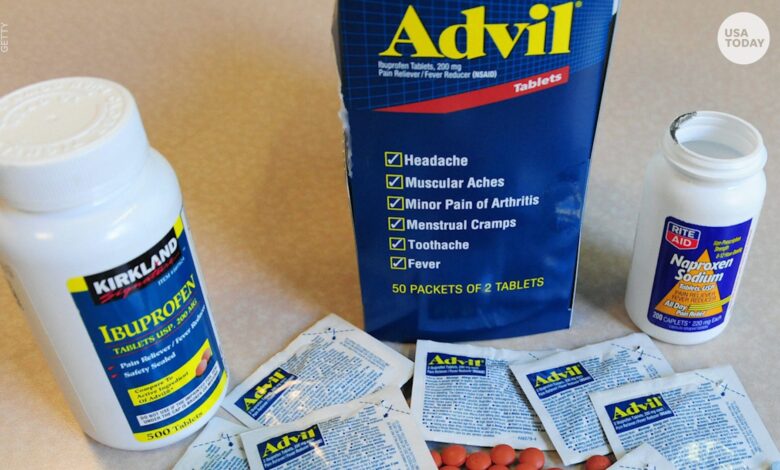How Long Does It Take For Ibuprofen To Work?

Ibuprofen the active ingredient in Advil, belongs to a class of medications called NSAIDs. It works by stopping the body’s production of a substance that causes pain, fever, and inflammation. Prescription ibuprofen is used to relieve pain, tenderness, swelling, and stiffness caused by osteoarthritis (arthritis caused by a breakdown of the lining of the joints) and rheumatoid arthritis (arthritis caused by swelling of the lining of the joints). It is also used to relieve mild to moderate pain, including menstrual pain (pain that happens before or during a menstrual period).
Nonprescription ibuprofen is used to reduce fever and to relieve minor aches and pain from headaches, muscle aches, arthritis, menstrual periods, the common cold, toothaches, and backaches. For strains and sprains, some doctors and pharmacists recommend waiting 48 hours before taking ibuprofen as it may slow down healing. If you are unsure, speak to your doctor or pharmacist. Ibuprofen is typically used for period pain or toothache.
Ibuprofen acts through stopping the creation of certain prostaglandins, which are lipids that deal with injury or illness and are active in the pathways that control inflammation, pain, and fever. Ibuprofen inhibits the action of cyclooxygenase, which is necessary for the prostaglandin creation. Ibuprofen is not selective and COX-2 prostaglandins are responsible for the desired analgesic and antipyretic effects.
How should this medicine be used?
Prescription ibuprofen comes as a tablet to take by mouth. It is usually taken three or four times a day for arthritis or every 4 to 6 hours as needed for pain. Nonprescription ibuprofen comes as a tablet, chewable tablet, suspension (liquid), and drops (concentrated liquid). Adults and children older than 12 years of age may usually take nonprescription ibuprofen every 4 to 6 hours as needed for pain or fever. Children and infants may usually be given nonprescription ibuprofen every 6 to 8 hours as needed for pain or fever, but should not be given more than 4 doses in 24 hours. Ibuprofen may be taken with food or milk to prevent stomach upset. If you are taking ibuprofen on a regular basis, you should take it at the same time(s) every day. Follow the directions on the package or prescription label carefully, and ask your doctor or pharmacist to explain any part you do not understand. Take ibuprofen exactly as directed. Do not take more or less of it or take it more often than directed by the package label or prescribed by your doctor.
Ibuprofen comes alone and in combination with other medications. Some of these combination products are available by prescription only, and some of these combination products are available without a prescription and are used to treat cough and cold symptoms as well as other conditions. If your doctor has prescribed a medication that contains ibuprofen, you should be careful not to take any nonprescription medications that also contain ibuprofen.
Swallow the tablet whole; do not chew or crush it.
If you are selecting a product to treat cough or cold symptoms, ask your doctor or pharmacist for advice on which product is best for you. Check nonprescription product labels carefully before using two or more products at the same time. These products may contain the same active ingredient(s) and taking them together could cause you to receive an overdose. This is especially important if you will be giving cough and cold medications to a child.
Nonprescription cough and cold combination products, including products that contain ibuprofen, can cause serious side effects or death in young children. Do not give these products to children younger than 4 years of age. If you give these products to children 4 to 11 years of age, use caution and follow the package directions carefully.
If you are giving ibuprofen or a combination product that contains ibuprofen to a child, read the package label carefully to be sure that it is the right product for a child of that age. Do not give ibuprofen products that are made for adults to children.
Before you give an ibuprofen product to a child, check the package label to find out how much medication the child should receive. Give the dose that matches the child’s age on the chart. Ask the child’s doctor if you don’t know how much medication to give the child.
Shake the suspension and drops well before each use to mix the medication evenly. Use the measuring cup provided to measure each dose of the suspension, and use the dosing device provided to measure each dose of the drops.
The chewable tablets may cause a burning feeling in the mouth or throat. Take the chewable tablets with food or water.
Stop taking nonprescription ibuprofen and call your doctor if your symptoms get worse, you develop new or unexpected symptoms, the part of your body that was painful becomes red or swollen, your pain lasts for more than 10 days, or your fever lasts more than 3 days. Stop giving nonprescription ibuprofen to your child and call your child’s doctor if your child does not start to feel better during the first 24 hours of treatment. Also stop giving nonprescription ibuprofen to your child and call your child’s doctor if your child develops new symptoms, including redness or swelling on the painful part of his body, or if your child’s pain or fever gets worse or lasts longer than 3 days.
Do not give nonprescription ibuprofen to a child who has a sore throat that is severe or does not go away, or that comes along with fever, headache, nausea, or vomiting. Call the child’s doctor right away, because these symptoms may be signs of a more serious condition.
Other uses for this medicine
Ibuprofen is also sometimes used to treat ankylosing spondylitis (arthritis that mainly affects the spine), gouty arthritis (joint pain caused by a build-up of certain substances in the joints), and psoriatic arthritis (arthritis that occurs with a long-lasting skin disease that causes scaling and swelling). Talk to your doctor about the risks of using this drug for your condition.
This medication is sometimes prescribed for other uses; ask your doctor or pharmacist for more information.
How Long Does It Take For Ibuprofen To Work?
Orally administered ibuprofen takes around 20 to 30 minutes to begin to work. However, it will take between 1 to 2 days for ibuprofen to work if you put it on your skin even though its effects generally last about 4 to 6 hours. The ibuprofen is rapidly absorbed. Peak serum ibuprofen levels are generally attained one to two hours after administration. The administration of Ibuprofen tablets either under fasting conditions or immediately before meals yields quite similar serum ibuprofen concentration-time profiles. When Ibuprofen tablets are administered immediately after a meal, there is a reduction in the rate of absorption but no appreciable decrease in the extent of absorption. The bioavailability of the drug is minimally altered by the presence of food.
Can you develop tolerance to ibuprofen?
Tolerance means that you will need a higher dose of the medicine for pain relief. Tolerance is normal and is expected if you take ibuprofen for a long time. Ibuprofen levels in your bloodstream are estimated to be at their maximum level after 1 to 2 hours. However, ibuprofen is quickly cleared from your body, this explains why ibuprofen stops working after a while. Depending on the condition that is being treated, you may need to take a dose every few hours.





